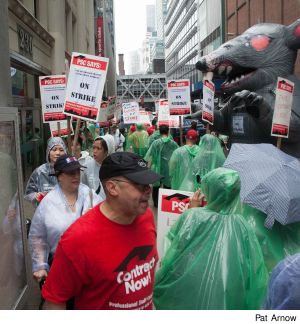Fed up with management’s demands for more concessions, workers in the CUNY Research Foundation Central Office Chapter carried out a one-day strike on July 1, that drew scores of fellow unionists to their picket line despite heavy showers.
The 102 members of the Central Office Chapter have been without a contract since the end of December. Management’s pay offer is still stuck below the rate of inflation and RF is demanding a two-tier wage structure that would compensate new hires less. After months of their employer’s foot-dragging at the bargaining table, the RF-CUNY workers decided they had to take a stand.
 |
No to 2-Tier
“Management has no problem paying itself greatly,” Chapter Chair Tony Dixon told Labor Press. “But when it comes to paying their union employees, for some reason they become cheap. They become misers.”
“We feel a two-tier system is unfair. People should get the same pay for the same work,” said Priscila Villacis, an assistant project administrator in RF-CUNY’s Office of Grants and Contracts. “Everyone should have the same benefits – both new hires and existing employees.”
In the interest of moving toward a deal, the union bargaining team had already agreed to increased health insurance premiums for all employees, as well as reduced annual leave and sick leave accrual. But when management negotiators dodged serious discussion of the outstanding issues, union members felt they had to to show they would not wait forever.
“We didn’t like that we had to strike for one day,” said Villacis. “But our message to management is that we’re united.”
The RF workers were joined on the picket line by PSC members from 15 campuses. They joined the picket line, they said, to tell RF management that its intransigence is unacceptable.
“They [RF Central Office employees] are an integral part of CUNY,” said Hugo Fernandez, assistant professor of photography and visual arts at LaGuardia. Fernandez is principal investigator on a grant with which he took students on a study-abroad trip to southern Chile and Argentina during the Spring semester, and he commended RF Central Office staff for their work administering the funds. “It’s only right that people who work there should be treated right and not like second-class citizens,” said Fernandez.
RF-CUNY processes more than $380 million in grants annually. A significant percentage is retained for overhead; those funds are often used for purposes far removed from scholarship and teaching, such as paying the RF’s anti-union consultants.
“The difference between the two sides on salary increases – roughly $80,000 annually – is just 6% of what the RF paid in one year to its anti-union attorneys,” said PSC Associate Executive Director Naomi Zauderer. The RF’s annual report shows it is in a strong financial position, she said, and union proposals would require no increase in overhead.
Frank Mirer, professor of environmental and occupational health at the CUNY School of Public Health, said the foundation could reach a fair settlement if it wanted to. “They are collecting a lot of money for CUNY, and CUNY controls what they are doing,” Mirer said. The RF “should provide equitable pay and benefits for…all their workers.”
While institutionally linked to CUNY, RF-CUNY is considered a private-sector entity. Its workers thus have the legal right to walk off the job, unlike most PSC members who as government employees are covered by New York’s Taylor Law forbidding strikes in the public sector. The willingness of RF members to exercise their right to strike impressed other PSCers who were on hand. “Walking the picket line is always a good experience and an empowering experience,” City Tech Chapter Chair Bob Cermele told Clarion. “It’s a flexing of union power.”
“It was refreshing to see people who still believe in union power,” said Berkis Cruz-Eusebio, an assistant HEO at Hostos. “It’s one thing to learn about the union in theory and another to see it in action,” she said.
Portia Seddon, an adjunct lecturer in women’s studies at Hunter, said that the RF workers’ struggle is an important one for part-time faculty who suffer under a two-tier system. “Adjuncts are some of the most vulnerable workers at CUNY, so it’s important we stand beside the RF workers,” Seddon said. “This is all part of the fight for a stronger union.”
The strikers and their supporters picketed outside RF headquarters at 230 West 41st Street from 8:00 am to 2:00 pm. The PSC provided brightly colored blue and green rain ponchos when the skies opened up mid-morning. In the midst of the bad weather, passing motorists enthusiastically expressed their support.
Honk for the Union
“The ‘Honk if You Support the Union’ signs got a lot of honks,” said Sharon Persinger, PSC chapter chair at Bronx Community College. “It really does raise your energy to come out and march and chant and dance in a circle with your union brothers and sisters.”
“We’re stronger if we all come together to support each other,” said Persinger, one of several PSC Executive Committee members who walked the line. All four of the PSC’s principal officers attended, as did representatives from NYSUT and SEIU 1199. Vincent Alvarez, president of the New York City Central Labor Council, joined the picket, as well as mayoral candidate Bill de Blasio.
“All you are saying is pay decent wages, decent benefits,” said de Blasio. “We will be with you every step of the way.”
“It was very encouraging that we had other people backing us up,” said Villacis. “We appreciated everybody who came out.”
Given the stance of RF-CUNY management toward its workers, Villacis expects there will be more battles ahead.
“We’re united,” Villacis said. “We’re in this to fight for a fair contract.”

